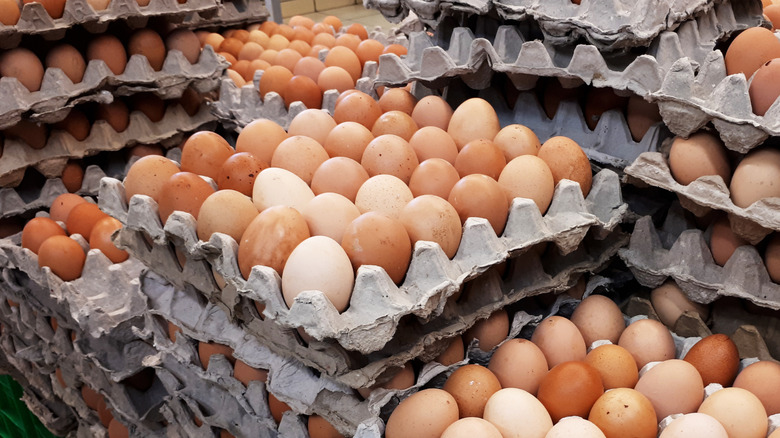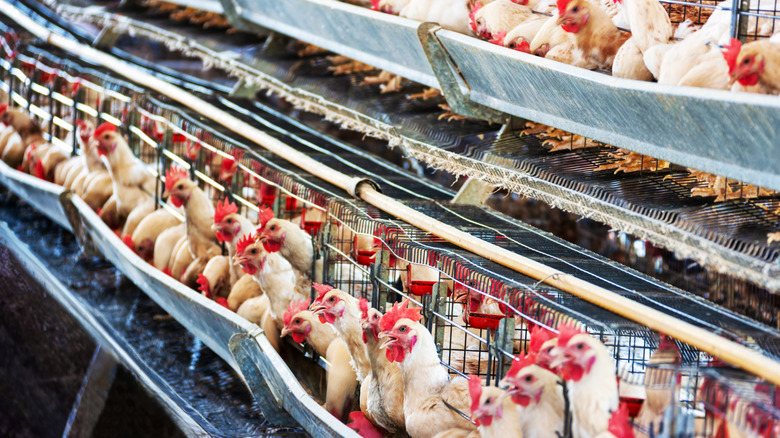These Countries Are Sending Eggs To The United States, But Will Prices Really Drop?
In 2025, the humble egg has become a nearly priceless delicacy, and a potential bargaining chip on the global stage. Egg prices have been skyrocketing, with prices almost 59% higher than they were a year ago, according to the February 2025 Consumer Price Index. The Trump administration has blamed former President Biden for the recent increase in inflation — with eggs largely seen as a stand in for larger consumer financial strains. However, wholesale and retail egg prices did experience a price drop in mid-March 2025, per USDA data.
Despite Trump taking credit for this most recent decrease in wholesale prices, the issue is more complicated than political maneuvering alone. In fact, the March price reprieve is largely due to a slightly stabilizing egg supply and a month free from avian flu outbreaks. However, experts advise that this relief may only be temporary, especially before egg-heavy holidays like Easter and Passover affect the market. USDA projections, as of March 2025, estimate that egg costs will rise 57.6% overall in 2025.
As a result, the Trump administration has announced plans to import millions of eggs from Turkey and South Korea. They have also drastically increased U.S. egg imports from Brazil to help meet domestic demand. It's worth noting that none of these countries are the usual suspects when it comes to supplying eggs to the United States. While this newfound reliance on outside sources might boost supply and even calm wholesale egg prices short-term, there is no guarantee it will translate into financial relief for consumers.
How geopolitical tensions are affecting eggs
The Trump administration's newfound egg partnerships with Turkey and South Korea come amidst rejection from a handful of European countries. Poland, Finland, and Denmark all declined the Trump administration's request for additional eggs to be sent to the U.S. While not entirely related, it's hard not to assume that Trump's stock-marking wrecking tariffs, and the subsequent retaliatory tariffs being levied on U.S. goods in response, aren't connected to this shift in global trade alliances and confidences. Additionally, recent security leaks featuring top U.S. officials disparaging Europe as "pathetic" might not help European nations feel generous with their already limited egg supply. Plus, in March, Veera Lehtilä, the head of the Finnish Poultry Association told YLE, "We have four million laying hens in total in Finland. The amount we could export would not solve their egg shortage."
Eggs are also one of the many goods the U.S. buys from Canada. While avian flu knows no borders, recent outbreaks have not impacted Canada's small-farm models as much as U.S. large-scale egg farms have been affected. Turning away from this long-term trading partner — which happens to also offer close physical access — certainly does not help U.S. consumers today. Plus, the decision to instead turn to egg providers more geographically far away will contribute to higher prices due to increased shipping costs, and could even lead to questionable quality given the difficulty of shipping eggs.
Combatting egg prices at home
Despite the fact that Trumps' campaign promise to reduce grocery prices is often at odds with his administration's aggressively nationalist, and even, at times, expansionist policies, he has announced plans to try and relieve egg prices through efforts here at home. These are in addition to — or perhaps regardless of — international egg supply assistance.
In a February op-ed published in The Wall Street Journal, the U.S. Secretary of Agriculture, Brooke Rollins, outlined a $1 billion plan to battle avian flu and lower egg prices. Rollins promised that $500 million of that budget would go to helping U.S. egg producers prevent contamination (via "gold-standard biosecurity measures"), while $400 million would go towards relief for farmers affected by avian flu, and another $100 million would be directed towards vaccine research and development.
While this sounds hopeful, the program's budget is meant to be funded via a controversial agency facing multiple lawsuits. Rollins stated, "We are working with the Department of Government Efficiency to cut hundreds of millions of dollars of wasteful spending," before adding, "We will repurpose some of those dollars by investing in long-term solutions to avian flu." While DOGE is supposedly slashing fraudulent spending, the Elon Musk-led group is also responsible for threatening Social Security and even closing dozens of physical Social Security offices. While average Americans may want cheaper eggs, they will ultimately have to weigh if that is worth the potential loss of Social Security.


